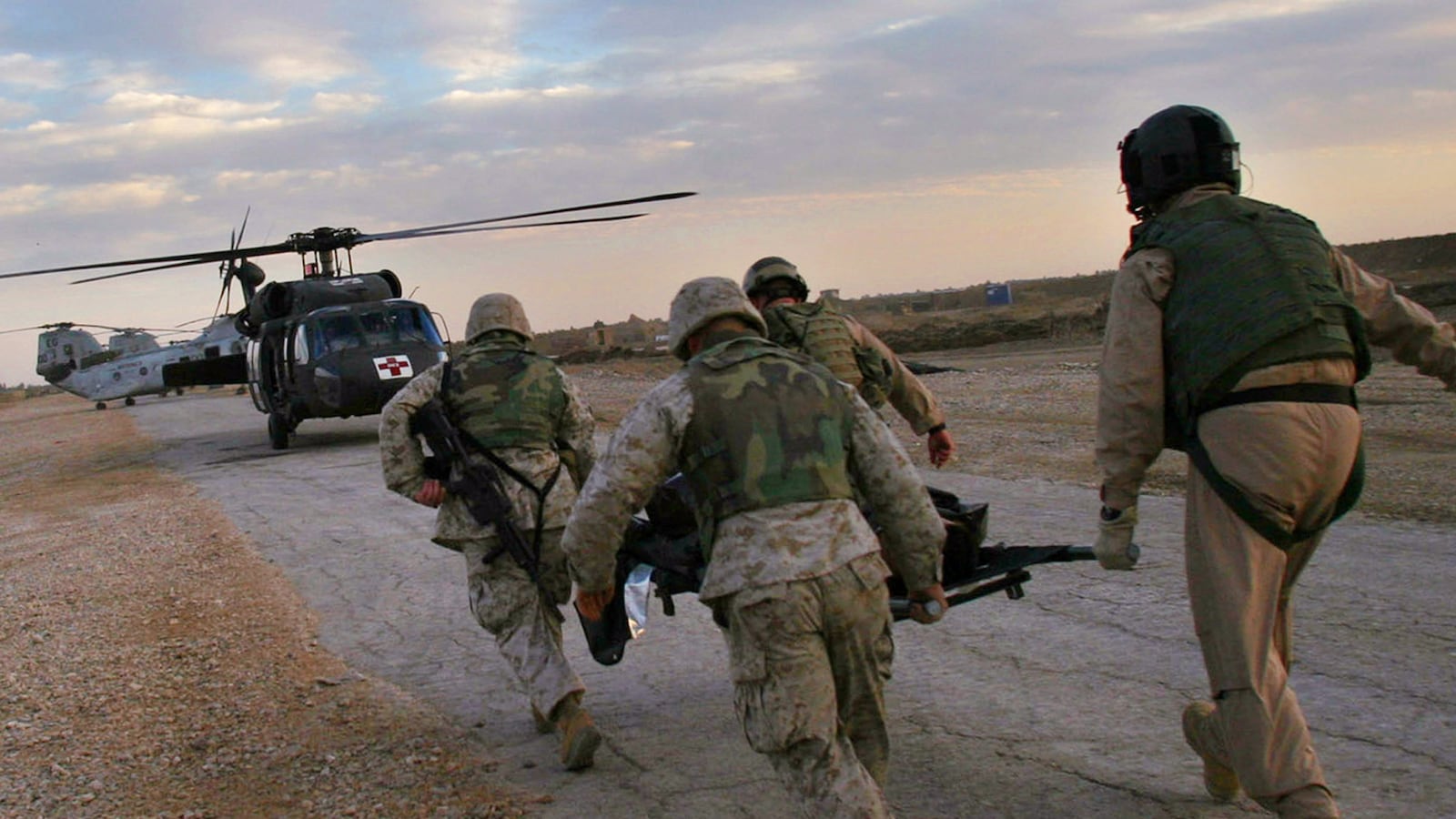On an absentee ballot mailed from Camp War Eagle, I voted John Kerry for president in 2004. I had been in Baghdad about eight months. Over that time I had come to believe that the army’s strategy—if you could call harassing Iraqi men, passing out soccer balls to their kids, building bigger and better chow halls on our FOBs, and driving the highway looking for bombs, a strategy—was headed for dismal failure.

President Bush pleaded with the country to stay the course. Meanwhile, I cast a ballot for the other guy.
Kerry’s candidacy was doomed, however, and his loss ensured that we would remain in Iraq for another seven years. Who knows—perhaps we would have stayed just as long, even if he had been elected.
One thing is certain: the bloodshed got worse. It took a state of virtual anarchy to force the Bush administration to change strategy, deploy more troops outside the wire, bribe the Sunni nationalists into working with the government, and convince radical Shia leaders like Moqtada al-Sadr that they could benefit more from the political process than by fighting the American occupation.
After we did all that, and with a little luck, things in Iraq improved—or at least the killing slacked off. These days, however, with Syria on the brink, the situation in Iraq has unfortunately deteriorated once again. This August was one of the deadliest months in that country since 2008.
In the midst of a widening regional conflict, and seemingly oblivious to the lessons learned over the past decade, now-Secretary Kerry has urged Congress to authorize the use of force against another regime that everyone believes has violated chemical weapons treaties.
It feels a little nutty, like it’s 2003 all over again, a remake with some of the same actors starring in different roles. Secretary Kerry, perceiving the historical echoes, has argued—at times condescendingly and dismissively—that despite how it might look, Syria is not Iraq.
Well, isn’t it close enough, though?
Syria is Just Next Door
The bulk of the killing in the Iraq War was done by Americans and Iraqis, but a significant number of foreign fighters did enter the country by way of its neighbors, including Syria. Undoubtedly, the Syrian conflict has been exacerbated by the proliferation of weapons and jihadis originally drawn to the region during the U.S. occupation of Iraq, a fact attested to by Baghdad’s recent deployment of thousands of troops to the Syrian border in an attempt to stop the flow of arms and fighters.
The two countries share more in common than geography. Before the fall of Saddam’s government, both were strongholds of the secular Ba’ath Party, a pan-Arab nationalist movement that, during the 1960s, split into factions, with one wing based in Baghdad and the other in Damascus. In addition to their shared political heritage, Iraq and Syria also share some demographic similarities; both are home to significant numbers of Sunni and Shia Muslims, which is unusual in the Islamic world, where the former sect predominates in all but a few countries.
In Iraq, before the war, a small group of Sunnis ruled a Shia majority. In present-day Syria, the reverse is true: the Alawites, an even smaller sub-sect of the minority Shia, are the ruling class. The pre-civil war leaders in both countries engaged in the routine oppression of minority groups and periodically in their wholesale murder. In Iraq, it was Saddam’s gassing of the Kurds and his slaughter of Shia in the south that led to retribution killings after he was deposed. In Syria, the current president’s father, Hafez al-Assad, who ruled the country before him, killed upward of 10,000 people in 1982 to quell an uprising in Hama by the Muslim Brotherhood. Among Syria’s rebels, there are some who personally lost relatives in that violence. Many more may not have suffered personal losses but have surely not forgiven the son for the sins of the father.
Opportunities for personal revenge are often intertwined with the political and religious causes that receive more attention. Some Syrian Sunnis are undoubtedly fighting for democratic freedom, but others, members of al Qaeda and related organizations, are fighting secular rule, to avenge the campaign against the Brotherhood in Hama, to establish Sharia law, and to stamp out a branch of Islam they view as apostate.
The Enemy of My Enemy Is My Enemy
It is hard to fathom siding with al-Qaeda in Syria, but then again, we arguably did something similar in Iraq. In one fell swoop we removed Saddam, a secular dictator whom bin Laden hated, and at the same time opened up a compelling new front for al Qaeda franchises. Using U.S. power to topple an unpopular tyrant in the name of democracy, without a clear idea of what would replace him, did not work as a strategy in Baghdad.
But maybe the Obama administration is cleverer than that. Given the growing influence of al Qaedaists in Syria, it is worth wondering whether President Obama is using the issue of chemical weapons as a pretext to kill two birds with one stone—to strike at both the Assad regime and the anti-American jihadists operating in the country.
Attacking al Qaeda in Syria would make sense, but wouldn’t seem to require additional congressional resolutions, as the president already has the authority to hit the group wherever it operates. Still, it is possible that the Obama administration seeks further congressional approval as political cover for a Syrian agenda that is broader than what it is letting on. If so, Obama should trust the American public to hear the whole case. Self-defense and defense-of-others are legitimate reasons to go to war. Preserving one’s credibility, on the other hand, is just a good enough reason to show up to work on time.
You Break It, You Buy It
Wars are a lot like bar fights. Sometimes they start with a sucker punch, but often they progress in a ritual escalation, with chest-thumping and threats coming before any blows are thrown. Most times, the ritual is all sound and fury and consummates its purpose without any actual violence. Usually, if a fight does break out, it is stopped before it spirals into an all-out brawl.
The problem with wars (and bar fights) is that you never quite know which one will be your last. Once violence starts, it becomes unpredictable. To jump into the fray is to assume some ownership of its unintended consequences, both moral and physical.
The Obama administration does not want us to worry so much about that angle. They say they are planning the equivalent of a gentlemanly fight, staged with certain unilateral ground rules. They say, for example, that any U.S. involvement in Syria would be limited to airstrikes. But the very idea of limiting war, once it begins, runs counter to all historical evidence.
History suggests wars inevitably grow, and sometimes much larger than any of the belligerents intended. Risk can be mitigated and managed, but never controlled. If and when we do take the plunge, the cause had better be worth it.
The Powell Doctrine
To act rationally and avoid being unduly swayed by momentary passions, we can only answer the question of when we should fight, by looking to our past. The so-called Powell Doctrine is one useful, backward-looking tool at our disposal. This doctrine was expounded by a group of men who, like John Kerry, experienced firsthand the greatest of all American military debacles. Those Vietnam veterans who stuck around long enough to rise through the national security apparatus wanted to prevent such a thing from ever happening again.
Accordingly, the Powell Doctrine is cautious. It prescribes a set of conditions that must be satisfied before America involves itself in a fight. In essence it states that we should not commit ourselves unless we know how to win and we can muster the national and international will to do so, decisively, no matter how ugly things get.
Syria fails every aspect of the Powell-Doctrine smell test. Our closest ally, the United Kingdom, has already decided—as it did during Vietnam—to sit this one out. Domestic support for striking Syria is polling at well below 50 percent. Finally, the Obama administration has articulated its reasons for wanting to use force, but not the end state that should be achieved by it. Do we leave Assad in power or do we remove him? What happens if, by attacking Assad’s power base, we empower the extremist factions among the rebels? What happens if, by striking at chemical weapons stockpiles, we inadvertently cause their proliferation? What if the airstrikes aiming to destroy chemical weapons systems and prevent their use against Syrian civilians end up killing those same civilians?
Iraq May Not Be Syria, But It’s Too Close for Comfort
One of the supreme ironies of the Iraq War is that Colin Powell, with his reputation for prudence and his alarming speech to the U.N., lent more credibility to the idea of a preemptive invasion than anyone else in the Bush administration could have.
Listening to Powell’s speech, many moderates thought that he, as a man who had fought in Vietnam and who had done much to illuminate that war’s strategic flaws, would never voice his support for another overseas intervention that was not well conceived and urgently necessary.
Powell has since expressed regret for the U.N. speech and called it the greatest black mark of his career. He can chalk it up to a set of interrelated mistakes. First, he bowed to pressure from hawks in the administration. Second, he got swept along in the popular current, oversimplified a complex reality for the benefit of savvy public relations, and appealed to emotion rather than reason. Third, he relied on spotty intelligence and the threat of chemical weapons to justify a preemptive strike.
Now, Secretary Kerry and President Obama would ask our elected representatives for the authority to do more or less the same thing: not to be the last man to die for a mistake, but the first to kill for one.
Iraq may not be Syria, but it’s too close for my comfort.






